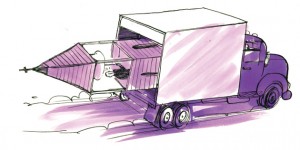Unbelievable urban stories: Moving a whole town 2 miles east, or sideways
How on earth does one move a whole town? Not lock, stock and barrel but perhaps by transporting the people and the beautiful old church (piece by piece) and building apartments, houses, hotels, offices and hospitals anew.
This fascinating piece in the BBC Magazine describes the extraordinary events underway in northern Sweden, more specifically Lapland, 11 miles from the world’s first Icehotel in the village of Jukkasjärvi. The whole town of Kiruna is moving two miles to the east, or “sideways” as it’s been described. It’s a 20-year-process with key milestones such as next month’s opening of the new town centre.
It’s a good example of a community prioritising its life in an orderly and supremely organized fashion. Kiruna seems to have decided that it was better to move and provide more space to the local iron mine, its largest employer. The mine was anyway digging ever deeper into a hill just outside the town and this was causing huge fissures across the city.
The community’s compliance provokes many questions. Some might say Kiruna caved in too tamely. Rather than wrangle over rights, principles of natural justice and the age-old question, ‘who owns the land – a community or a company’, it simply elected to move. Others believe it was pragmatic good sense that drove the acquiescence. Without a thriving mine, Kiruna (the existing city and the new one) would be out of a job.
Whatever it was, the move is new territory for urban planners. Yvel Sievertsson, urban transformation officer at the mining company tells the BBC, they tried to seek out similar situations from around the world, “looking at how other countries like Germany and parts of Africa have handled similar projects, but they are just moving small villages and houses, not huge city centres… it’s a completely unknown situation.”
Mostly, of course, cities don’t move because entrenched communities dig in their heels and prevent displacement. Consider the turmoil over Ile a Vache in Haiti, whose beauty has been its undoing. With a major tourism project on the cards, residents have been protesting against their possible expulsion from their land. “Even our bones won’t leave,” one of the protestors was recently quoted to say.



